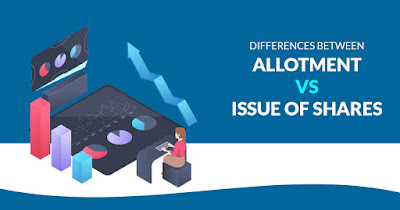Running a startup is an unrealistic idea until you have a huge amount of money/capital to invest in the assets and infrastructure. Making huge investments alone is quite impossible for any individual or group and here comes the need for them to ask for help (capital) from the outsiders (investors) in lieu of the shares/debentures in the company.
However, there are other ways for a company to get loans but the most preferred way of raising the capital for them is by issuing the shares and debentures in their company to potential investors. There is a cyclic process of development, the more the investors invest in companies, the more the companies will yearn profits which will lead the company to progress. The company earning good will give more profits to its stakeholders who are owning shares and debentures in the company.
Shares and Its Kinds
Shares are granted by the company in lieu of the investment made by the investor and thus the investor/shareholder becomes a partial owner in the company. The entire capital needed by the company is divided into smaller units that have the same monetary value. These units or Shares are offered to the investors in lieu of capital given by them. Further the transaction of shares is authenticated by the purchase issued by the company to the shareholder. The purchase is called ‘Share Certificate’.
The value of shares for purchase is called ‘Share Price’ and the actual value of the shares that is written in the books of account is called Par/Nominal/Face value of the shares. From the overall profit earned a part is kept with the company and the rest is diffused in between the shareholders in the form of ‘Dividend’.
‘Dividends’ are the returns of the investment made by the investor.
Kinds of Shares
- Equity Shares - One cannot redeem the shares once they have invested in it. The only way here to get the money before the dividend is by selling the shares to another investor who is interested in the deal. While dispersing the dividends equity shareholders will get their percentage after the preference shareholders are done. Equity Shareholders have Voting Rights in the Company.
- Preference Shares - Such shareholders are paid dividends at a fixed rate and get an upper-hand when it comes to paying dividends. Such shareholders have on voting rights in the company’s major decisions.
Debentures and Its Kinds
A business needs capital to progress and therefore it takes loans from the potential investors in lieu of Debentures. Debentures can be held by banks, financial institutions, and individual investors. People or groups owning debentures are called ‘Debenture Holders’ in the company and the proof of ownership they hold is called 'Debenture Certificate’.
Debenture holders in the company are also denoted as ‘Creditors’. The group of debenture holders is paid no matter if the company is in a loss or profit. Interests are paid to the investors (on regular intervals or upon maturity) and the loan amount is repaid to them upon maturity of ‘Loan Bond’. They are denied any voting rights in the company.
Kinds of Debentures
Depending on the nature of payment or maturity period, below mentioned are some types of debenture:- Redeemable Debentures
- Irredeemable Debentures
- Bearer Debentures
- Registered Debentures
- Convertible Debentures
- Naked Debentures
Shares V/S Debentures
Though both are the mediums of raising capital for the company there is a difference in the pattern the profit is distributed among the Types of Shares and Debentures.
- Returns
Shares - The rate of dividend is entirely based on the profits earned by the company.Debentures - The rate of interest is fixed no matter if the company is in profit or loss.
- Payment Policies
Shares - Shareholders are paid after debenture holders get their interest.Debentures - Debenture holders get the priority over shareholders when it comes to payment of interest or dividend.
- Obligations
Shares - The dividend earning of the shareholder entirely depends on the profit earned by the company. The company is not obliged to pay if there is no profit.Debentures - The company is obliged to pay interest to the debenture holders no matter the company is in profit or loss. It is anyways the interest on the loan that the company has taken and it needs to repay.
- Companies Exiting
Shares - Shareholders might lose their part of ownership in companies’ profits if the company winds up its business.Debentures - Companies while winding up their business are liable to pay the entire amount of the investment to debenture holders.
- Right To Vote
Shares - Shareholders enjoy the right to vote in the major decisions of the company.Debentures - Debenture holders are denied any voting rights in the major decisions of the company.
- Companies Exiting
Shares - Shareholders might lose their part of ownership in companies’ profits if the company winds up its business.Debentures - Companies while winding up their business are liable to pay the entire amount of the investment to debenture holders.
- Risk
Shares - The risk of losing the profit is more are the shareholders are paid from the residual profit of the company.Debentures - The risk of profit earning is NIL as they get timely interests and loan repayment on contract maturity regardless of the company’s condition in the market.
- Redeemability
Shares - The shares once purchased are non-redeemable except in the case of preference shares.Debentures - They can only be redeemed upon maturity. Interests are paid at regular intervals or in any other pattern decided.
- Maturity
Shares - Shares have no maturity period and therefore are paid only upon closing.Debentures - Debentures have a maturity period that is mentioned on the debenture certificate and the company is required to repay upon maturity of those debentures.
Also Read:- Equity Shares: Classification, Benefits & Drawbacks
In the End
By the above discussion, it is evident that both shareholders and Debenture holders can be called investors of the company. Every company tries very hard to maximize the returns to shareholders and also to pay interest to debenture holders in time. By increasing the shareholder’s wealth company makes its shareholders loyal to the company for a lifetime.
Debenture holders and shareholders both are contributors to the progress of any company. Clearly debenture holders are a priority at the time of payment but a company never fails to bring in profits for its shareholders as well. In the worst cases, this happens that shareholders are left barehanded. Companies always try to yearn profit for themselves and their shareholders so that they (companies) can sustain for long. In fact, the right to vote is a benefit given to the shareholders because they are the ones who will be equally affected by the progress or breakdown of the companies.



